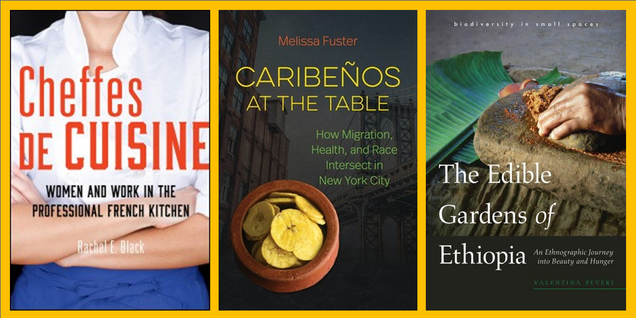Fall 2021 Pépin Lecture Series in Food Studies & Gastronomy

Fall 2020 lectures will be presented in webinar format. Registration is free and open to the public: please follow the link for each program to register.
Cheffes de Cuisine: Women and Work in the Professional French Kitchen
Rachel Black, Associate Professor, Anthropology Department Connecticut College
Though women enter France’s culinary professions at higher rates than ever, men still receive the lion’s share of the major awards and Michelin stars. Rachel E. Black looks at the experiences of women in Lyon to examine issues of gender inequality in France’s culinary industry. Known for its female-led kitchens, Lyon provides a unique setting for understanding the gender divide, as Lyonnais women have played a major role in maintaining the city’s culinary heritage and its status as a center for innovation. Voices from history combine with present-day interviews and participant observation to reveal the strategies women use to navigate male-dominated workplaces or, in many cases, avoid men in kitchens altogether. Black also charts how constraints imposed by French culture minimize the impact of #MeToo and other reform-minded movements.
Evocative and original, Cheffes de Cuisine celebrates the successes of women inside the professional French kitchen and reveals the obstacles women face in the culinary industry and other male-dominated professions.
Cosponsored by the BU Women’s, Gender & Sexuality Studies Program
Friday, October 15, noon to 1:00 pm. Register here.
Caribeños at the Table: How Migration, Health, and Race Intersect in New York City
Melissa Fuster, Associate Professor, Tulane University School of Public Health
Melissa Fuster thinks expansively about the multiple meanings of comida, food, from something as simple as a meal to something as complex as one’s identity. She listens intently to the voices of New York City residents with Cuban, Dominican, or Puerto Rican backgrounds, as well as to those of the nutritionists and health professionals who serve them. She argues with sensitivity that the migrants’ health depends not only on food culture but also on important structural factors that underlie their access to food, employment, and high-quality healthcare.
People in Hispanic Caribbean communities in the United States present high rates of obesity, diabetes, and other diet-related diseases, conditions painfully highlighted during the COVID-19 pandemic. Both eaters and dietitians may blame these diseases on the shedding of traditional diets in favor of highly processed foods. Or, conversely, they may blame these on the traditional diets of fatty meat, starchy root vegetables, and rice. Applying a much needed intersectional approach, Fuster shows that nutritionists and eaters often misrepresent, and even racialize or pathologize, a cuisine’s healthfulness or unhealthfulness if they overlook the kinds of economic and racial inequities that exist within the global migration experience.
Cosponsored by the BU Graduate Programs in Nutrition
Friday, November 12, noon to 1:00 pm. Register here.
The Edible Gardens of Ethiopia: An Ethnographic Journey Into Beauty and Hunger – Biodiversity in Small Spaces
Valentina Peveri, Food Anthropologist, American University of Rome
What is a beautiful garden to southern Ethiopian farmers? Anchored in the author’s perceptual approach to the people, plants, land, and food, The Edible Gardens of Ethiopia opens a window into the simple beauty and ecological vitality of an ensete garden.
The ensete plant is only one among the many ‘unloved’ crops that are marginalized and pushed close to disappearance by the advance of farming modernization and monocultural thinking. And yet its human companions, caught in a symbiotic and sensuous dialogue with the plant, still relate to each exemplar as having individual appearance, sensibility, charisma, and taste, as an epiphany of beauty and prosperity, and even believe that the plant can feel pain. Here a different story is recounted of these human-plant communities, one of reciprocal love at times practiced in an act of secrecy. The plot unfolds from the subversive and tasteful dimensions of gardening for subsistence and cooking in the garden of ensete through reflections on the cultural and edible dimensions of biodiversity to embrace hunger and beauty as absorbing aesthetic experiences in small-scale agriculture. Through this story, the reader will enter the material and spiritual world of ensete and contemplate it as a modest yet inspiring example of hope in rapidly deteriorating landscapes.
Based on prolonged engagement with this ‘virtuous’ plant of southwestern Ethiopia, this book provides a nuanced reading of the ensete ventricosum (avant-)garden and explores how the life in tiny, diverse, and womanly plots offers alternative visions of nature, food policy, and conservation efforts.
Friday, November 19, noon to 1:00 pm. Register here.